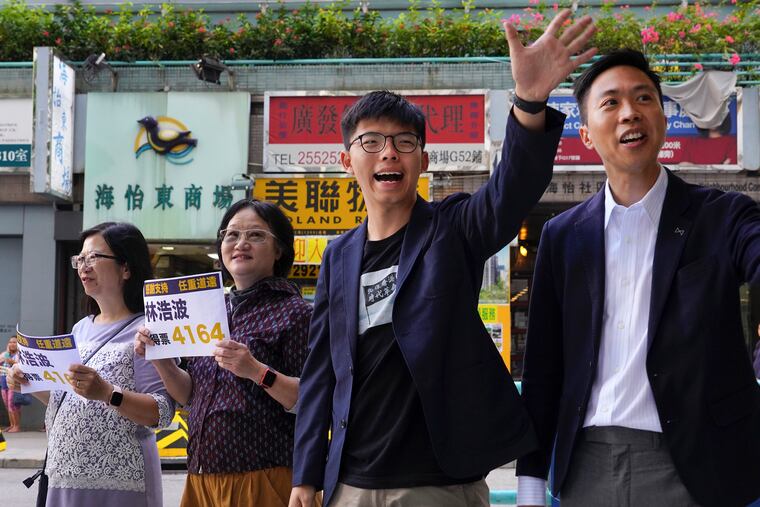In Washington and in Hong Kong, the fight to preserve democratic values | Trudy Rubin
Trudy Rubin on a reminder to Americans that democratic values must never be taken for granted.

This Thanksgiving, I’m grateful for some recent reminders of the need to protect democratic values that too many Americans take for granted.
There was the powerful statement this week by U.S. District Judge Ketanji Brown Jackson that “Presidents are not kings,” in her ruling that former White House lawyer Don McGahn cannot refuse to testify to Congress because the Trump administration says so. White House officials, she wrote, owe allegiance not to the person of the president but to the constitutional principle of separation of powers — a concept the Founding Fathers devised “to prevent tyranny."
Then there was the striking testimony by Lt. Col. Alexander Vindman and Fiona Hill at impeachment hearings about misuse of presidential powers to extort a foreign government to dig up dirt on a political opponent. Both naturalized citizens, these two Americans reminded us that immigrants often support democratic values like rule of law with a passion that has ebbed among the native born.
And, even as impeachment hearings were ongoing, there was a parallel drama in Hong Kong where young people are fighting for democratic rights promised them by China. The latest episode in their David vs. Goliath struggle: an astonishing and unexpected landslide victory in local elections Sunday, the only elections in which Hong Kongers have full suffrage.
» READ MORE: Hong Kong has become a crucial test of U.S.-China relations | Trudy Rubin
The Hong Kong story is far from over, as Beijing continues to stonewall. But the protesters’ struggle is so impressive that it should inspire Americans distraught at White House denigration of democratic precepts. So, in this Thanksgiving week, here are the thoughts of a key figure in the pro-democracy camp, whom I spoke with in Hong Kong shortly before the vote.
Joshua Wong, 23, was the key leader of the 2014 Umbrella Movement which occupied central Hong Kong in an effort to achieve universal suffrage. Jailed for 30 days earlier this year and banned from running in the local elections, he insists he is optimistic about Hong Kong’s future, despite the huge odds against the pro-democracy movement.
As we spoke, radical students were still surrounded by police in Polytechnic University and none of the democracy activists believed they could win more than half the seats in Sunday’s local elections. Wong and other Umbrella Movement leaders had been replaced by a leaderless movement that operated via Twitter and the Telegram app.
As we sat in a hotel restaurant, a well-dressed man and woman came up to Wong and screamed epithets in his face.
Yet this slight young man stared straight ahead and calmly recounted how the democracy movement extended far beyond young radicals. “The reality,” he said, “is that older people, office workers, the middle class are in solidarity and help with supplies and ferrying students out.”
The reason for the broad support: Hong Kongers were angry at “police brutality and lack of faith in the legal system.”
The six months of protests had been sparked by Hong Kong leader Carrie Lam’s proposal that Hong Kongers could be extradited for trial to the Chinese mainland, which alienated even conservative businessmen. Lam’s rejection of dialogue after peaceful protests by two million Hong Kongers, followed by police brutality toward demonstrators, led to violence.
» READ MORE: "We need help": Young protesters stand up for Hong Kong Democracy | Trudy Rubin
What impressed me about Wong was his confidence that violent demonstrators could segue into more peaceful tactics. “If you believe in a peaceful way, we have a boycott campaign toward pro-Beijing restaurants,” he explained, showing me a Google-style map that indicated pro-democracy restaurants dotted in yellow, and pro-Beijing in blue.
He predicted that if the pro-democratic candidates in local elections won half the seats “they can show that the wars of democracy can replace the wars of Beijing.” In fact, after registering hundreds of thousands of first-time voters and getting out a record vote, the pro-democracy camp netted 392 of 452 open seats.
Yet, so far, Lam insists she won’t meet protesters’ demands, which include progress toward universal suffrage for her job and for the legislative council, as promised by China when it regained Hong Kong from Britain in 1997. The demands also include an independent investigation into police violence.
Wong predicted that before the Chinese New Year (Jan. 25, 2020) the Hong Kong government would set up the independent investigation because “it is the demand of 80% of the population.” We’ll see.
However, Hong Kong’s leaderless youth movement must now devise a strategy for dealing with a hostile Beijing-backed government. It must decide whether to focus on contesting legislative elections in 2020 — which are heavily rigged — or return to demonstrations and possible violence.
Wong insists that Congress’ passage of the Hong Kong Human Rights and Democracy Act (which President Donald has yet to sign) is of key importance, even though the democracy movement is homegrown.
Whatever their future, the determination of Hong Kong’s citizens to fight for rule of law should inspire Americans to defend their own rule of law against White House challenges. If Wong retains his optimism, democrats in America have no excuse to cave.